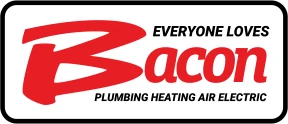Severe weather is a part of life that many north Texans have become accustomed to. As a North Texas homeowner, you can expect hail, tornados, and heavy storms throughout most of the summer, and they often come with extreme damage. However, what came as an unwelcome surprise for many homeowners was the devastating freeze last February. DFW homes just weren’t built for weeks of below-freezing temperatures.
At Bacon, we take the safety and well-being of our customers seriously. To help you prepare for any storm, here are some of the most common preventative questions we get asked by our customers.
What can I do to prevent my home from being damaged?
While it may be obvious, inspecting your home yourself can be helpful if you know what to look for. A professional home inspection is crucial to assess what needs the most attention in your home.
For example, you can expect the worst if you go into winter or summer with a troublesome HVAC unit. Extreme temperatures, hot or cold, put a strain on your unit’s reliability. Roofing or plumbing issues are only going to exacerbate the problem and be more expensive. An inspection will allow you to properly assess what needs to be repaired or replaced and what can wait until next season.
In the summer and fall, take time to check for overhanging branches, dead limbs, and weak areas that could be troublesome in high winds, hail, or heavy snow.
How to know if my roof needs to be replaced?
The most common issue for homeowners is a damaged roof. Your roof is your home’s shield against every weather event, and more often than not, it shows. Suppose any part of your roof needs to be replaced. Consider investing in something like architectural shingles or metal roofing. Metal roofing, such as stone-coated steel and standing seam roofing, can survive severe storms with minimal aesthetic damage. Look for materials with Class 3 or 4 ratings under the UL 2218 standard.
While impact-resistant roofing choices may be more expensive than an average roof, they also last much longer and provide better protection against North Texas’ extreme weather. The cost is worth it, and most insurance companies offer a discount for Class 4-rated roofs.
What can I do to protect my pipes?
To protect your outdoor plumbing, you will need to disconnect all spigots and locate the outdoor water shut-off valve.
If your pipes are near the exterior of your home or in an area that doesn’t receive heat, they’ll be at a higher risk of freezing and bursting. You might find exposed pipes in places like your attic, garage, and cabinets. Protect this plumbing with foam insulation or wrapping you can find at your local home improvement store.
Keep all doors sealed as much as possible and avoid going in and out of the house; your heater should protect pipes from freezing in your home. If your power goes out like last winter, use towels or old tee shirts to insulate your pipes.
Make sure your home is stocked with bottled water, firewood if you own a fireplace, and ready-to-eat food.
Your water heater plays a prominent role in maintaining a stable, warm temperature for your water. So, keep up with seasonal maintenance to pinpoint any problem areas for your water heater and pipes.
It’s crucial that everyone takes preventive measures to prepare for severe weather. Luckily, it’s much easier when you have the Bacon team to rely on. So don’t forget to contact Bacon for inspections, repairs, advice, or anything else you might need to keep your home ready to take on anything!



